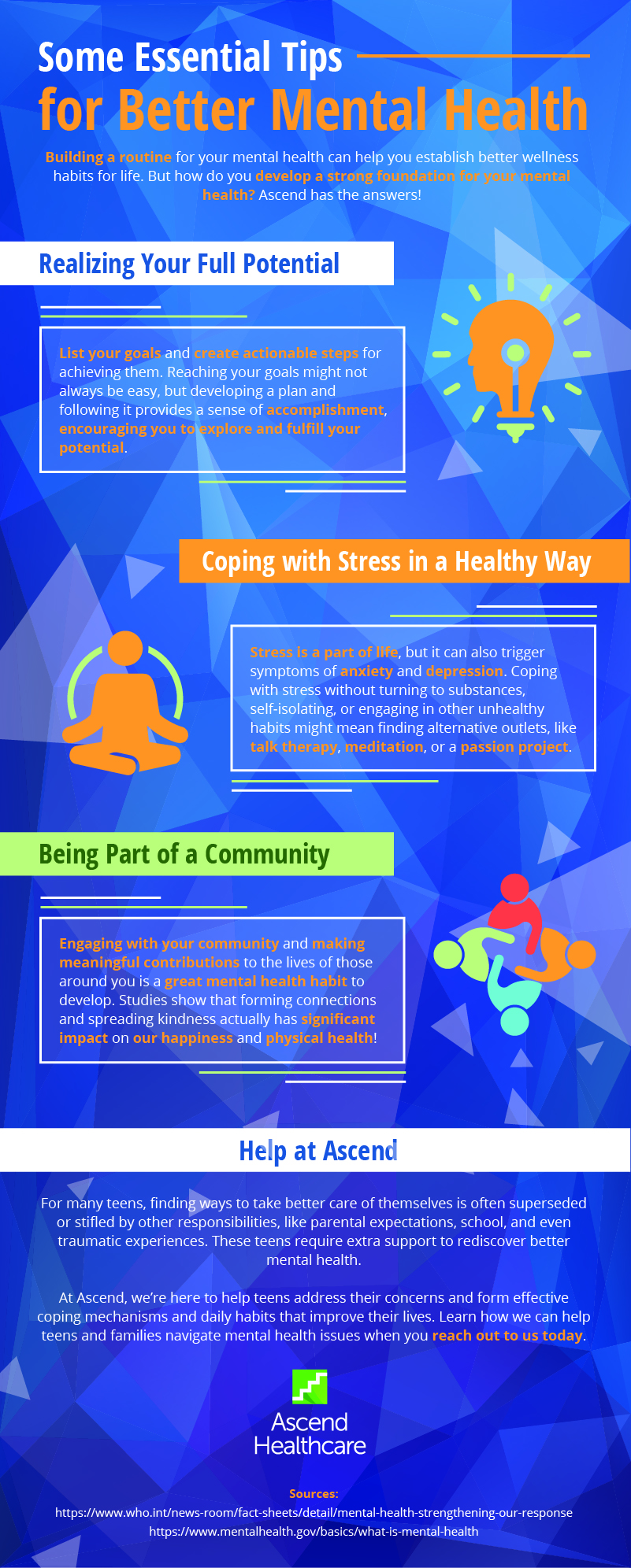Create Your Powerful Mental Health Routine
Due to the rise of mental health issues in today’s fast-paced society, taking care of your mental health has never been more important. The first step towards developing good mental health habits is to understand what factors contribute to the onset of depression, anxiety, and other common mental health issues. Then structure your life around your mental health as a powerful way to make sustainable, positive progress and help yourself feel better and enjoy life to the fullest.
At Ascend, we specialize in providing teens with a healing and welcoming environment that empowers them to make positive changes in their lives. Our community-based programs can help teach teens how to take care of their mental health and establish a strong personal identity. Learn more about the importance of a mental health routine here!
The Importance of a Mental Health Routine
Having a set of established self-care habits that help you stay centered and positive goes a long way toward facilitating good mental (and physical) health. However, these habits don’t need to feel like work. When used correctly, your good mental health habits will consist of things that help your body and mind stay balanced and able to adapt to situations. A person with good mental health is usually calm, centered, and capable of addressing difficult situations without letting stress overcome them.
While a routine may sound like it prevents creativity or freedom, this isn’t the case! Instead, having a routine for mental health just means incorporating a few coping mechanisms and essential skills into your everyday life that actually allow you more opportunities for self-exploration and discovery.
 What Are Good Mental Health Habits?
What Are Good Mental Health Habits?
Good mental health habits can come in many different forms. Because everyone is unique, the key to your habits means finding out what works for your specific personality and situation. Over time, your mental health coping skills may evolve and change as you grow.
Some of the most essential habits involve physical changes that help to improve the health of your brain and body. These changes can make it easier for you to feel comfortable in your skin and enhance your self-esteem. Some of our recommendations for caring for your mental health include:
Create a Regular Sleep & Wake Cycle
Your body requires stability and regularity to experience effective rest. When you go to sleep and wake up at similar times every day, your body undergoes less stress because you’re achieving a healthy sleep cycle. Develop this good mental health habit by setting an alarm clock and making sure you limit screen time and activity within an hour of bed to dramatically improve your ability to fall asleep and stay asleep.
Unfortunately, there are mental health concerns that can significantly hamper your ability to get restful sleep. Trauma, depression, anxiety, substance use, and more affect your brain chemistry and can make sleep elusive. Addressing the cause of your mental health concerns can help you find balance and ensure sleep becomes easier.
Exercise
Most people don’t associate exercise with mental health. But working out releases numerous chemicals and hormones that impact brain function! While exercise helps you blow off steam and trains your body to handle stress, it also boosts your mood with endorphin and serotonin output. Exercising can even build self-confidence, banishing anxiety.
Give Yourself Some Time
While sleeping is a crucial aspect of developing a mental health routine, actively resting also gives your body a chance to unwind while you’re awake. Active resting might mean pursuing hobbies, spending time with friends, or just reading a good book. At Ascend, we encourage you to develop this good mental health habit through the use of experiential therapy techniques that help teens find a passion.
Teen Mental Health Treatment at Ascend
Along with a healthy diet and mindful living, these good mental health habits can go a long way toward developing a positive mental state for the long term. However, many teens face mental health challenges that prevent them from achieving mental wellness and require a higher level of care. If you think that resetting in a residential treatment environment could be the change that’s needed, we encourage you to reach out to our admissions team online or by phone at 310.388.3713 today.



